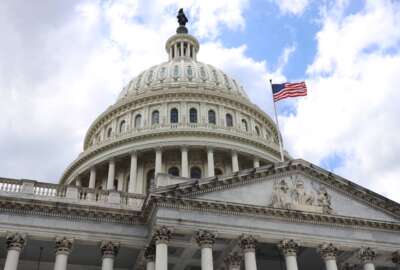The big news in Congress this week? You already know it
Congress is out of D.C. this week for the 4th of July holiday. But it has a lot of spinning plates. Including three big appropriations bills.
Congress is out of D.C. this week for the 4th of July holiday. But it has a lot of spinning plates. Including three big appropriations bills . Homeland Security Secretary Alejandro Mayorkas can remain confident he’ll get a paycheck. The Federal Drive with Tom Temin gets an update from WTOP Capitol Hill Correspondent Mitchell Miller.
Interview Transcript:
Tom Temin And they’re on district duty leading up to the holiday, I guess is the accurate way to put it. But some movement on appropriations in the house tell us more.
Mitchell Miller Right? They had a flurry of activity right at the very end of the week, they got through three major appropriations bills, as you mentioned, Homeland Security, Defense, and then foreign operations. Basically, the State Department bill, all of these got through they were largely on party lines as was expected to happen. That defense bill includes a lot of things, of course, $833 billion in terms of weapons and adds more F 35s. It also for people that are really interested in the pay, it could include pay increases for the lowest ranked military personnel, and there does seem to be bipartisan support for that. It’s potentially a raise depending on who the person is of anywhere from 15 to 20%. And if that happens, eventually, that would be the biggest raise in decades, all military are scheduled to get a 4.5% pay increase. There is a little bit of division within the political parties about whether or not this is going to hurt retention at the higher levels, because obviously people that are ranked higher are going to see these raises and pay and wonder about themselves as well. But many lawmakers do agree that paying at the lower level is really needed, because the recruiting efforts have been pretty paltry for the Army and Navy in particular. And they want to shore that up.
Tom Temin And on the homeland security bill. And that includes Justice Department. Oh, boy, there’s some controversial things in there, visa vie the Senate.
Mitchell Miller Absolutely. Homeland Security. One of the biggest is a nearly a $1 billion dollar cut in the Justice Department, Attorney General Merrick Garland, who often doesn’t weigh in on these things, actually, as soon as the money came out, that that kind of money was going to be cut. He immediately criticized that said that would gut the department. It would hurt prosecutions, it wouldn’t hurt investigations. FBI is also slated to have its money cut, and that includes providing no money for the FBI headquarters that’s supposed to be built in Greenbelt. So there’s going to be a huge tussle over that. Homeland Security, a lot of Republicans are trying to basically thin out a lot of the ranks. This goes back to that argument where they say there is a two tier legal system, they didn’t go quite to the level that some of them had hoped for. But clearly, they have made some major cuts in Homeland Security. And then Secretary, Mayorkas you mentioned the homeland security secretary, they actually want to try to reduce his pay down to either nothing or virtually $1. That, of course, is not going to fly. And then going back to the Defense Secretary Lloyd Austin, they also are trying to reduce his pay down to essentially nothing. So there’s a lot of symbolic amendments that have been added to this. And this is why it’s going to be a really hard slog to get anywhere in the Senate, it’s probably just going to get slammed into a wall, once it gets a look there in the upper chamber.
Tom Temin And as we get closer to the elections, that means things slow down even more, and therefore, maybe not even simply a continuing resolution, but perhaps even more drastic.
Mitchell Miller Right. I mean, even though we are now in the summer, and we’ve got four appropriations bills passed, because they include what many Democrats consider poison pills. It’s really doubtful that they’re going to move anywhere in the in the Senate. And so this appropriations bill, there was a big flare that went up from the House’s top Democrat last week. Republicans are marching us to a government shutdown. And part of the reason for that is Democrats are pointing to the fact that beyond the defense spending, that the domestic spending is slated to be really slashed by Republicans and for Democrats. They say this is a non starter that that was a bipartisan agreement last year that was supposed to stay in place. It’s obviously fraying at the edges, if not right in the middle of it. And so Democrats are warning that they’re going to once again potentially beyond this collision course later in the year,
Tom Temin We’re speaking with Mitchell Miller, he’s Capitol Hill correspondent for WTOP. And they’re still dealing with the telework issue in the federal workforce too, aren’t they?
Mitchell Miller Right, and in this case, they’re dealing with federal telework inside of the defense appropriations bill. One of the biggest provisions in connection with that measure would prohibit DoD from using any of its funding for any telework or remote work that’s done on what they call a regular and reoccurring basis. And so there’s a lot of concern among people who are proponents of telework that say, just because there’s been some problems and you go back to COVID. And that there has been, as we’ve talked about this big push to get people back into the office that you can’t just necessarily eliminate it. So I think that is going to be yet another struggle. And the White House just related to that provision alone, but also many other provisions, as said that President Biden would veto any bill that includes that and a lot of these other provisions.
Tom Temin And here we are really just on the cusp of Fourth of July. Nobody knows golly, I wonder who can drive further with a golf ball? That is?
Mitchell Miller Yeah, there was a lot of discussion about that, as the lawmakers flooded out of the Capitol last week in connection with finishing up all those appropriations bills we just talked about. So there’s going to be obviously a huge amount of discussion about the campaign. And then in July while there are some working days, that they can get more done. When you look at the calendar for August, there is literally one day in session for the US House of Representatives. So count me skeptical about whether or not they can get all 12 of these appropriations bills done. That is the goal of House Majority Leader Steve Scalise. He said that at the outset of all of this appropriation season, but it just doesn’t look like it’s going to happen right now. So I think what is going to happen is probably in the coming weeks, we’re going to see some more progress after the fourth of July on several of these appropriations bills. But then once we get into August, there’s really not going to be anything happening. And then of course, we jump into September and while they’re back in session, lo and behold, believe it or not, the early voting season starts usually for many of the states now in mid to later in the month of September. So we’re literally going to be in the heart of the campaign season. And we both know what that means in terms of legislative priorities. Everything just gets kind of held up. So I think we’re in for another long summer and perhaps looking again at another threat for a possible government shutdown later in the year.
Copyright © 2024 Federal News Network. All rights reserved. This website is not intended for users located within the European Economic Area.
Tom Temin is host of the Federal Drive and has been providing insight on federal technology and management issues for more than 30 years.
Follow @tteminWFED






